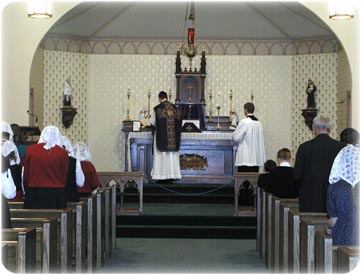
Recently I just purchased a copy of the Catechism of the Council of Trent (CCT). I found the work so profound and clear that I felt I had to share it and, of course, comment on its application today. Lets begin with the pinnacle of our faith, the Holy Eucharist.
Pt. II Chapter IV Question I:
"Why the Mysteries of the Eucharist ought to be treated and received with the deepest reverence."
"As of all the sacred mysteries bequeathed to us by our Lord and Saviour as most unfailing instruments of divine grace, there is none comparable to the most holy sacrament of the Eucharist; so, also, for no crime is there a heavier punishment to be feared from God, than for the unholy or irreligious use by the faithful of that which is full of all holiness, or rather which contains the author himself and source of holiness. This the Apostle wisely saw, and of it he has openly admonished us; for when he had declared the enormity of their guilt, 'who discerned not the body of the lord', he immediately subjoined: 'Therefore are there many infirm and weak among you, and many sleep.' That the faithful people, therefore, aware that to this heavenly sacrament are due divine honours, may derive therefrom abundant fruit of grace, and escape the most just anger of God, pastors will explain, with the greatest diligence, all those things which may seem calculated more fully to display its majesty."
The article begins immediately by emphasizing the absolute Holiness of the Eucharist. It draws the equation between belief and action. The Eucharist is God Almighty and thus should be feared as such. It explains that "for no crime is there a heavier punishment to be feared from God." This passage instantly draws to mind the acts of sacrilege in the Church today. When parishes and clergy treat the Eucharist as a joke (clown masses, barney masses, etc.) or as if what happens at the altar as nothing, they are in fact giving such treatment to God.
It draws the equation between belief and action. The Eucharist is God Almighty and thus should be feared as such. It explains that "for no crime is there a heavier punishment to be feared from God." This passage instantly draws to mind the acts of sacrilege in the Church today. When parishes and clergy treat the Eucharist as a joke (clown masses, barney masses, etc.) or as if what happens at the altar as nothing, they are in fact giving such treatment to God.
One of the things that struck me is how this catechism admonishes pastors of souls. Question I states that "pastors will explain, with the GREATEST diligence, all those things which may seem calculated more fully to display its [the Eucharistic mystery] majesty."

Do we see this today? With modern church designs and contemporary liturgy? Is this great mystery properly presented to the faithful? Is the majesty of God properly displayed when the Mass is said on a bare table in a room with whitewashed walls? Is the solemnity of the moment of God coming amongst us once again on the altar really displayed by a pastor having everybody act like yahoos? I think not. Perhaps all of this comes from a fundamental misunderstanding of God, creating the image of a "buddy Jesus." I think this may be partly to blame and thus most of the responsibility falls on the bishops to make sure that their priests are properly formed.
Even though the brunt of responsibility does fall on the bishop, some also falls on priests and seminarians. They must realise that intellectual assent in not enough, according to the CCT. Beyond mere intellectual realization, they must properly display such majesty and glory to their parishioners in their churches, sermons, and liturgical practices.
There is some weight to be given to pastoral implementation of some things. Although immediate implementation of proper pious practices into a previously impious parish would be like thrusting Judas into the arms of Christ after betraying him thus causing him to flee, one should still not make changes slowly. After all, we're talking about peoples souls. I think it is inevitable that some people leave because of proper changes to the building, liturgy, or sermon content, but doing so, they reject the notion that proper majesty is due to God.
Many may be asking by now in this post "If people are going to church in such a bad parish, why ruffle feathers? At least they are going to Mass." Well, as the Catechism says "That the faithful people, therefore, aware that to this heavenly sacrament are due divine honours, may derive therefrom abundant fruit of grace, and escape the most just anger of God." We see here that this is not just about aesthetic tastes. If people are not brought to realize the majesty in the reality of Christ being present transubstantially in the Eucharist they are deprived from the grace of God. Not only that, but they risk committing sacrilege and angering God.
Of course, I think it goes without saying that in my opinion the traditional liturgy (of any rite) solves such dilemmas.

















































 Am I weird because I think black vestments are cool?
Am I weird because I think black vestments are cool?



